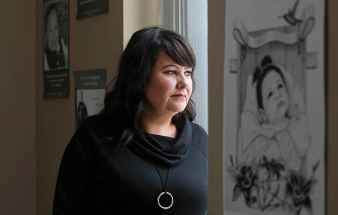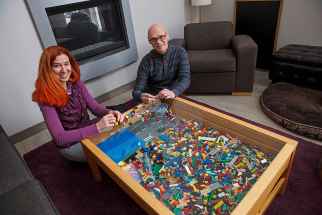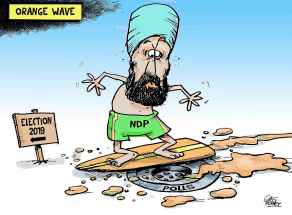Lego, seriously How companies are using Lego to solve problems, build teams, encourage creativity... and have fun
Read this article for free:
or
Already have an account? Log in here »
To continue reading, please subscribe:
Monthly Digital Subscription
$0 for the first 4 weeks*
- Enjoy unlimited reading on winnipegfreepress.com
- Read the E-Edition, our digital replica newspaper
- Access News Break, our award-winning app
- Play interactive puzzles
*No charge for 4 weeks then price increases to the regular rate of $19.00 plus GST every four weeks. Offer available to new and qualified returning subscribers only. Cancel any time.
Monthly Digital Subscription
$4.75/week*
- Enjoy unlimited reading on winnipegfreepress.com
- Read the E-Edition, our digital replica newspaper
- Access News Break, our award-winning app
- Play interactive puzzles
*Billed as $19 plus GST every four weeks. Cancel any time.
To continue reading, please subscribe:
Add Free Press access to your Brandon Sun subscription for only an additional
$1 for the first 4 weeks*
*Your next subscription payment will increase by $1.00 and you will be charged $16.99 plus GST for four weeks. After four weeks, your payment will increase to $23.99 plus GST every four weeks.
Read unlimited articles for free today:
or
Already have an account? Log in here »
Hey there, time traveller!
This article was published 08/02/2019 (2497 days ago), so information in it may no longer be current.
Those Lego building blocks you played with as a kid have grown up. Seriously.
While spinoffs like the Lego Movie 2: The Second Part, theme parks, discovery centres and other operational decisions are helping drive profits for the Danish toy company that a little more than a decade ago was in serious financial difficulty.
It’s not clear what impact it had on the bottom line, but as part of that re-organization it “divested” the intellectual property of an intriguing, if a little quirky, side venture called Lego Serious Play (LSP).
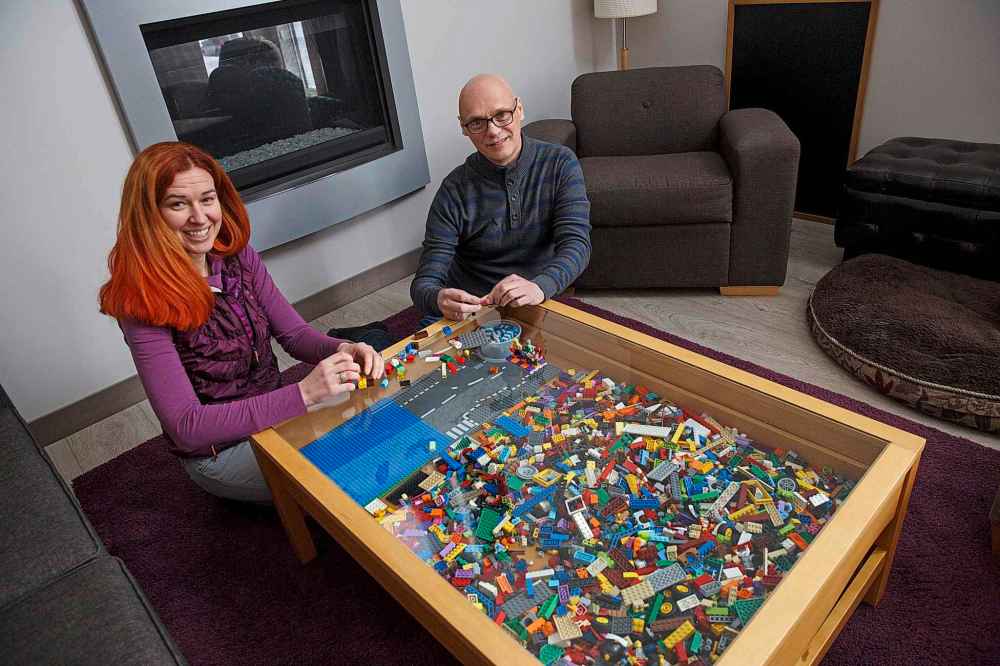
Although the Danish toy company is no longer the “owner” of the Lego Serious Play intellectual property, LSP probably has an even deeper connection to the toy company than the movie does, because rather than animating the toys, its effectiveness is all about having the Lego bricks in your hands.
LSP is a legal trademarked facilitated problem-solving technique used around the world with governance now provided by a not-for-profit called the Association of Master Trainers.
It is much more popular in Europe and Asia than it is in North America, but a Winnipeg applied health sciences PhD named Kristen Klassen is trying to get North Americans to become more open to the creativity and connectiveness that Lego can inspire.
LSP is used by businesses and organizations who want to transform their organization from a group of individuals into a collaborative team. It may be serious, but it’s also, well, Lego. The magic — and fun — is that the process requires building stuff with Lego bricks.
A briefing with the “sponsor” is held before Klassen or any certified trainer, introduces a curated selection of the satisfying bricks and participants creating structures that are shared and discussed with a particular organizational problem-solving goal in mind.
There are more than 7,000 certified LSP facilitators worldwide but only 14 people certified to train the trainers and Winnipeg-based Klassen, a University of Manitoba grad, is the only one of those 14 based in North America.
Among other things, the benefit that results from that is Klassen and the two associates of her company called Brickstorming, hold free hands-on LSP introduction workshops at the Millennium Library every other month. The next one is Feb. 27.
(Klassen has a busy schedule training groups of between six and 12 would-be LSP trainers and is away for about four days every month. This weekend she’s in Las Vegas, next month Montreal. In April, she’s in Boston.)
Since forming Brickstorming in 2015 and taking the plunge to go full time at it two years ago, Klassen knows only too well the difficulty in explaining to people how it works.
“I can tell you why it exists and how it can help, but to explain it I need to get hands on bricks,” she said.
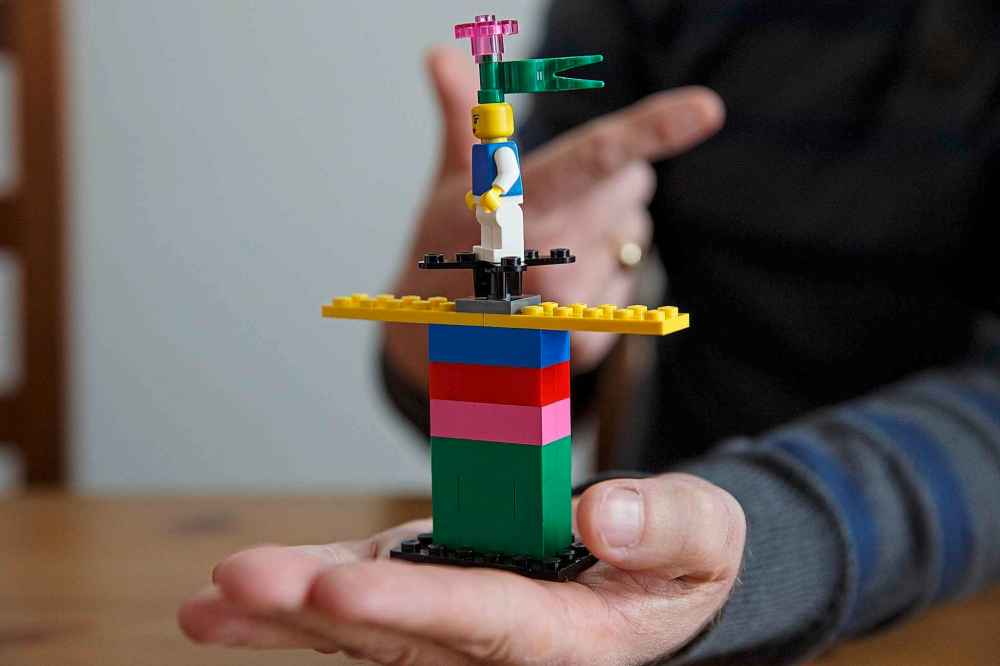
That’s one of the reasons the free demonstrations at the library are so valuable.
While she says using LSP is a good way to get an organization to move from a collection of individuals to an actual functioning team, she does not like to refer to the process as a team building workshop.
“We come in and talk about whatever the issue is you are working through or whatever the problem is,” she said. “Your team may not be working well together for a number of reasons. It’s likely that a team development workshop is not going to fix it. We work on whatever the core issue or the root problem is. The team development will result as a by-product of us addressing that issue.”
And the way it is addressed is by everyone building stuff with Lego… together. And they’re not building the Starship Enterprise or Hogwarts Castle.
“We don’t ever build models of the tangible,” she said. “We build the intangible. The things you inherently know but can’t express in traditional language or traditional form.”
Darrell Cole, who joined Brickstorming after becoming a certified LSP facilitator in September — Cole is the founder and former CEO of Career Trek — said, “It can be an emotional experience. It’s not about the CEO building the biggest and best model. Everyone participates.”
He said there is a big difference between how much a company engages with a new strategic plan that the CEO announces from the corner office and the buy-in that can be achieved after the process has been hashed out in a facilitated LSP process where everyone has had a hand in it.
“We like to talk about the difference between leaning in and leaning out,” Klassen said.
Her “elevator pitch” about LSP is that it is “a facilitated thinking, communication, and problem solving technique for real people in real time in 3-D.”
Trying to introduce the use of play as a serious way to discover solutions to nagging organizational challenges is not an easy sell in North America where there is a rigid belief in the separation of work and play.
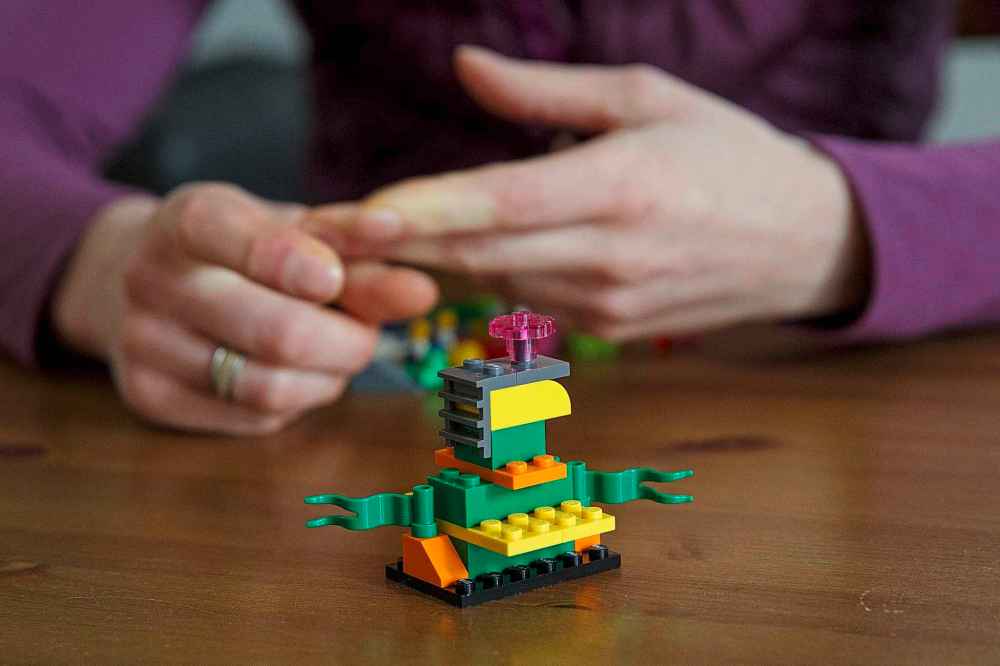
Klassen said that she’s made some inroads over the past couple of years and has had engagements with organizations across the economic spectrum from oil and gas, mining and forestry companies to pharmaceutical companies and not-for-profits.
In addition to the challenges of explaining how it works, many companies require competing bids when deploying consultants but Brickstorming is usually the only entity offering the service.
And it’s also hard to say how much it will cost because every encounter is custom designed. The process starts with a detailed interview process to find out what the organization is trying to work through.
“We need to know what the symptoms are so we can actually identify what the root problem is and design a customized solution to deal with it,” she said. “The other thing that is really unique to our process is an underlying belief that the answer is in the room.”
The exercise is about people working together, with their hands, with a common goal.
“They are the ones who need to be there. They have the solutions. We are not experts,” she said. “We don’t come in and give you the answer. We come in and help the organization develop the answer themselves.”
martin.cash@freepress.mb.ca

Martin Cash has been writing a column and business news at the Free Press since 1989. Over those years he’s written through a number of business cycles and the rise and fall (and rise) in fortunes of many local businesses.
Our newsroom depends on a growing audience of readers to power our journalism. If you are not a paid reader, please consider becoming a subscriber.
Our newsroom depends on its audience of readers to power our journalism. Thank you for your support.

